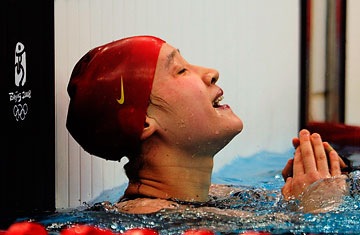
China's Liu Zige celebrates winning the women's 200m butterfly final at the National Aquatics Center on Aug. 14
The Beijing Olympics may boast one of the coolest natatoriums in Olympic history — the luminescent bubble-wrapped confection called the 'Water Cube' — but Chinese swimmers weren't expected to make much of a splash in its pool lanes. But Liu Zige, a 1.81m (5'11") butterfly specialist, had other ideas.
On Aug. 14th, the 19-year-old grabbed a gold by setting a world-record time in the 200m butterfly final. Just behind her was her Chinese compatriot Jiao Liuyang, who claimed the silver. Australian Jessicah Schipper took the bronze. "I didn't expect I could swim so fast," said a delighted Liu, who demolished Schipper's previous world record by 1.22 seconds — an eternity in the split-second world of swimming.
Liu's feat marked the return of a once-fearsome Chinese women's swimming squad. In 1994, a fleet of well-muscled Chinese dominated the pool at the Asian Games. But the secret to China's success was soon exposed: drugs. Seven of China's Asian Games swimmers tested positive for banned substances and were stripped of their gold medals. That ignominious streak extended to the 1998 World Championships, where four more Chinese swimmers were caught using drugs.
After back-to-back disgraces, the Chinese coaches may have gotten their teams clean, but they also disappeared from the medals tables. "We are working hard to rebuild our credit in international swimming," Yuan Jiawei, former chief of the Chinese swimming association, told the Chinese state media in 2004. "It will be a long-term effort." By the 2004 Athens Games, that campaign had begun to pay off. China captured a gold and a silver in swimming with nary a failed drug test.
There's little question that China desperately wants its team to avoid scandal in Beijing. Any drug-tainted performance will be a huge loss of face for a country that wants to prove that its athletic successes can come naturally. In the run-up to Beijing, just before American swimmer Jessica Hardy was cut from the U.S. swimming team because of a positive doping test, China, too, busted its best men's backstroker, Ouyang Kunpeng, for steroid use and slapped him with a lifetime ban. Ouyang claimed that the anabolic agent entered his system through contaminated food, not through deliberate drug use — an explanation that China's anti-doping association didn't buy.
So far, Liu is China's only swimmer to strike gold these Olympics. But the Chinese team has performed impressively. On August 10, Zhang Lin made history as the first Chinese man to win an Olympic swimming medal when he claimed a silver in the 400m freestyle. The Chinese women's squad also scored a second-place finish in the 4x200m freestyle relay, while Pang Jiaying contributed a bronze in the women's 200m freestyle. And the Chinese may not be done yet, with several key races in the next few days. With seven swimming gold medals as of the afternoon of Aug. 14, America is the undisputed star of the Water Cube. But China is swimming comfortably in its wake.
